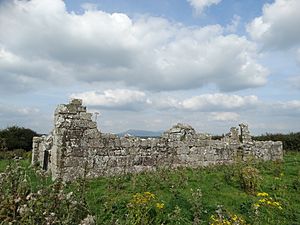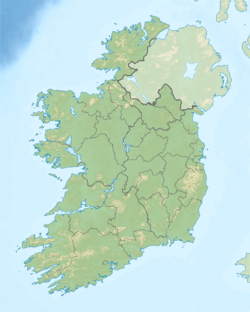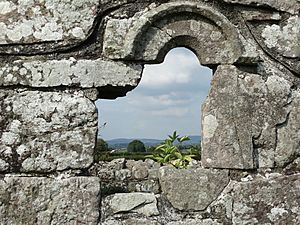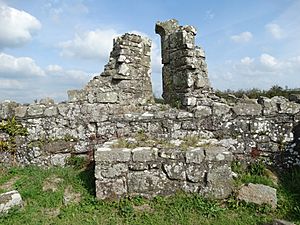Kileenemer Church facts for kids
Quick facts for kids Kileenemer Church |
|
|---|---|
| Killeenemer Church | |
|
Cill Aonamra
|
|
 |
|
| 52°12′56″N 8°19′42″W / 52.215483°N 8.328405°W | |
| Location | Killeenemer, Ballindangan, County Cork |
| Country | Ireland |
| Denomination | Catholic (pre-Reformation) |
| Architecture | |
| Functional status | ruined |
| Style | Romanesque |
| Years built | c. 12th century AD |
| Specifications | |
| Length | 17 m (56 ft) |
| Width | 9 m (30 ft) |
| Height | 1.5 m (4 ft 11 in) (max height of remaining walls) |
| Number of floors | 1 |
| Floor area | 160 m2 (1,700 sq ft) |
| Materials | stone, mortar |
| Administration | |
| Diocese | Cloyne |
Kileenemer Church is a very old church in County Cork, Ireland. It was built a long, long time ago, in the Middle Ages. Today, it is a National Monument, which means it is protected because of its historical importance.
Where is Kileenemer Church?
This historic church is found about 2.5 kilometers (about 1.5 miles) south of a village called Ballindangan. It sits to the east of the River Funshion.
The History of Kileenemer Church
Kileenemer Church was built around the 12th century. That means it's about 900 years old! Over time, parts of the church were changed. For example, the way the stones were laid in the south wall shows that the church was made longer after it was first built.
The name "Kileenemer" is a bit of a mystery. Experts think it might come from an old Irish phrase, Cillín Íomair. This means "Ivor's little church."
What the Church Looks Like
The church building is shaped like a rectangle. It no longer has a roof, so you can see the sky when you look up from inside. On the west wall, there is a main entrance with a rounded arch.
Some parts of the walls, especially at the corners, have been repaired over the years. If you look closely at the stones, you might see special marks. These are called mason's marks. They are like signatures left by the stonemasons who built the church. Many of these marks look like horseshoes.
Around the church, there are signs of an early ecclesiastical enclosure. This was a special area that belonged to the church. It might have been used for burials or other religious activities. You can also find a bullaun nearby. A bullaun is a stone with a bowl-shaped hollow, often linked to ancient religious sites.
 | Aurelia Browder |
 | Nannie Helen Burroughs |
 | Michelle Alexander |




